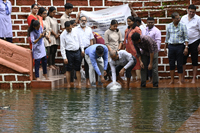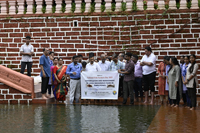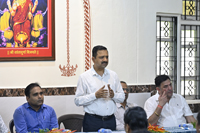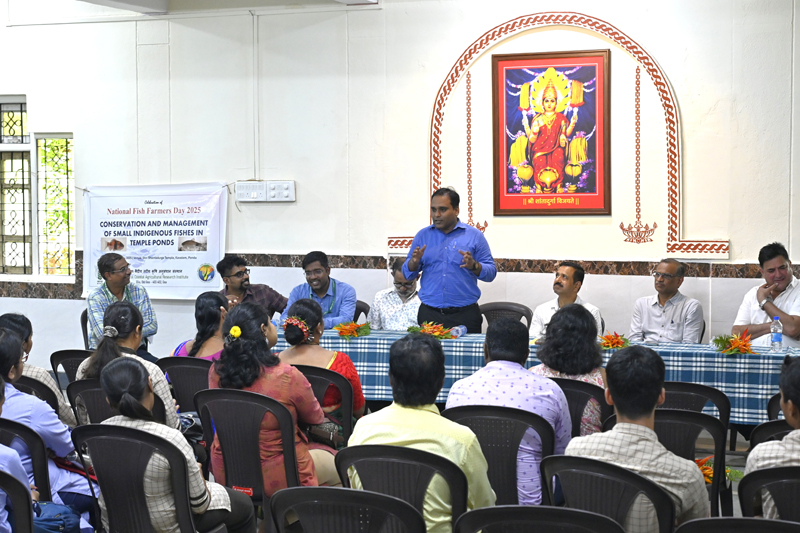
ICAR CCARI organised Fish Ranching at Shri Shantadurga Temple, Kavalem, Goa
ICAR CCARI organised Fish Ranching at Shri Shantadurga Temple, Kavalem, Goa
As part of the National Fish Farmers Day 2025 celebrations, ICAR-Central Coastal Agricultural Research Institute (ICAR-CCARI), Goa organized a Fish Ranching Programme on 10th July 2025 at the sacred Shri Shantadurga Temple pond, Kavalem, Ponda. The initiative aimed to raise awareness about conservation of small indigenous fish species (SIFs) and promote sustainable fishery practices through community participation and temple pond rejuvenation. Over 30 participants including temple management committee, villagers and school students were present for the event. The programme began with a welcome address by Shri Trivesh Mayekar, Scientist (FGB), followed by the inaugural address by Dr. Parveen Kumar, Director, ICAR-CCARI, Goa, who emphasized the institute’s commitment to biodiversity conservation and the importance of temple ponds in preserving aquatic ecosystems. Shri Santosh Kumar Reddy, IFS, Deputy Conservator of Forests, South Goa, graced the occasion as Chief Guest and appreciated the efforts of ICAR-CCARI in engaging local communities in aquatic conservation through culturally significant venues such as temple ponds. Dr. C. U. Rivonker, Senior Professor of Marine Sciences at Goa University, attended as Guest of Honour, highlighting the ecological role of temple ponds and their potential as live gene banks for indigenous species.
A lecture on “Fish Conservation in Ponds” was delivered by Shri Trivesh Mayekar, emphasizing habitat enrichment, species selection, and the role of public awareness in protecting native fish diversity. This was followed by a talk on “Temple Ponds and Indigenous Fish Conservation” by Dr. Sreekanth G. B., Senior Scientist (FRM), who explained the cultural and ecological significance of temple ponds and the need for integrating conservation with religious and traditional values. The fish ranching activity was carried out, during which more than 500 fingerlings of 12 species of Small Indigenous Fishes (SIF) were released into the temple pond as part of a community-based conservation effort. The fingerlings included Mola carplet, Malabar danio, Mahecola barb, Sucker fish, Olive barb, Melon barb, Indigo barb, Broad-striped rasbora, Filament barb and other SIFs. The compering for the entire programme was effectively carried out by Shri Rahul Kulkarni, ACTO (Soil Science), ICAR-CCARI, ensuring smooth coordination and engagement throughout the sessions. The event aimed to reinforce the importance of restoring temple pond ecosystems and supporting biodiversity through participatory action. This initiative reflected ICAR-CCARI’s continued commitment to field-based conservation strategies and promotion of sustainable inland fisheries. The programme was coordinated by Shri Trivesh Mayekar, Scientist (FGB), Dr. Sreekanth G. B., Senior Scientist (FRM), Shri Rahul Kulkarni, ACTO (Soil Science). Mr. Vishwajeet Prajapati, Technical Officer; Mr. Dilkush Velip, Technical Assistant (T3), Mr. Harshvardhan Shetye, Young Professional (Fisheries Science); and Mr. Suyash Patil, Research Associate.



